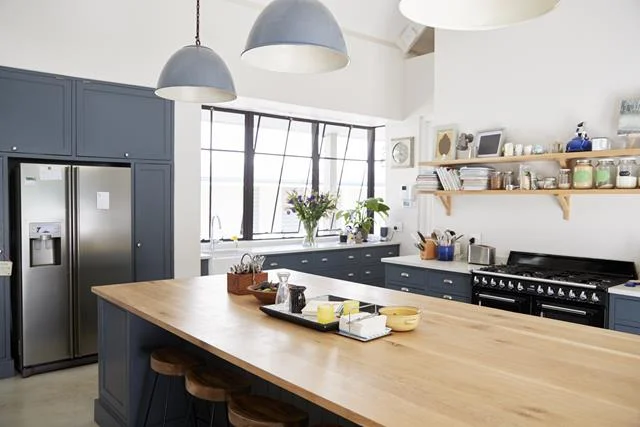Are you wondering, “How do I start my own home decorating business?” With the increasing popularity of home decor businesses, there has never been a better time to enter the industry.
From interior design to home staging, there are numerous opportunities for aspiring entrepreneurs to carve out their niche and build a successful business. In this article, we will guide you through the essential steps of starting your own home decorating business, from identifying your niche to creating a strong brand and providing exceptional customer service.
The home decorating industry is experiencing significant growth as more homeowners seek professional expertise in beautifying their living spaces. With the rise of social media and home improvement television shows, people are increasingly interested in enhancing their homes with unique and stylish designs.
As a result, there is an increasing demand for skilled professionals in the home decorating industry. Whether you have a passion for interior design or a talent for transforming living spaces, now is the perfect time to pursue your dream of becoming a home decor entrepreneur.
In this comprehensive guide, we will walk you through the crucial steps of starting your own home decorating business. We will explore how to identify your niche in the industry, conduct market research to understand your target audience, create a solid business plan, navigate legal and financial considerations, build a strong brand identity, effectively market and promote your business, and provide exceptional customer service.
By empowering you with practical insights and actionable tips, we aim to help you launch your own successful home decorating venture.
Identifying Your Niche in the Home Decorating Industry
When starting your own home decorating business, it’s crucial to identify your niche within the industry. With the increasing demand for personalized and unique home decor solutions, identifying a specific niche will help you stand out in the market and attract potential customers. Whether it’s focusing on eco-friendly decor, vintage styles, or modern minimalist designs, finding your niche will give you a competitive edge.
Research Current Market Trends
To identify your niche in the home decorating industry, it’s essential to research current market trends and consumer preferences. Look at popular interior design styles, color schemes, and decor elements that are currently in demand. By understanding what customers are looking for, you can tailor your niche to cater to specific preferences and needs.
Assess Your Skills and Interests
Consider your skills and interests when identifying your niche in the home decorating industry. Are you passionate about sustainable design? Do you have a talent for creating bohemian-inspired spaces? Assessing what you excel at and enjoy will help narrow down your focus and allow you to offer specialized services that align with your expertise.
Evaluate Competition
Analyzing the competition within the home decorating industry can also help you determine your niche. Take a look at other businesses offering similar services in your area and see where there may be gaps or opportunities for differentiation. By evaluating what others are offering, you can position your business uniquely within the market.
By taking these steps to identify your niche in the home decorating industry, you can create a strong foundation for your business and attract potential clients who are seeking specialized services that align with their personal style preferences.
Conducting Market Research
Before starting your own home decorating business, it is crucial to conduct thorough market research to understand your target audience. This involves gathering data on consumer behaviors, preferences, and trends in the home decorating industry. By understanding your potential customers, you can tailor your products and services to meet their specific needs and desires.
One way to conduct market research is through surveys and interviews with potential clients. This will allow you to gather valuable insights into what influences their purchasing decisions, what they are looking for in a home decorator, and how much they are willing to spend on home decorating services. Additionally, analyzing demographic data such as age, income level, and geographic location can help you identify your target audience more effectively.
Another important aspect of market research is studying your competition. By analyzing other home decorating businesses in your area or within your niche, you can gain a better understanding of their strengths and weaknesses, as well as identify any gaps or opportunities in the market that you can capitalize on.
Understanding your target audience through comprehensive market research is essential for the success of your home decorating business. It will enable you to make informed decisions when it comes to product development, pricing strategies, marketing efforts, and overall business planning.
| Market Research Insights | Benefits |
|---|---|
| Gathering consumer behaviors and preferences | Customizing products/services |
| Analyzing demographic data | Identifying target audience more effectively |
| Studying competition | Understanding market gaps/opportunities |
Creating a Business Plan for Your Home Decorating Business
Starting your own home decorating business can be an exciting and rewarding venture, but it’s important to have a solid plan in place to ensure your success. A well-thought-out business plan can serve as a roadmap for your company, helping you make informed decisions and stay on track towards achieving your goals. Here are some key steps to consider when creating a business plan for your home decorating business:
- Define Your Services: Clearly outline the specific services you will offer, whether it’s interior design, home staging, or home styling. Consider what sets your services apart from competitors and how you can provide value to your clients.
- Identify Your Target Market: Determine who your ideal clients are and where they are located. Understanding the demographics, preferences, and needs of your target market will help you tailor your marketing efforts and service offerings.
- Set Clear Goals: Establish both short-term and long-term goals for your home decorating business. Whether it’s reaching a certain number of clients within the first year or expanding into new markets within five years, having clear objectives will give you direction and motivation.
In addition to these steps, it’s essential to address financial projections, pricing strategies, and operational plans in your business plan. This document should also include an analysis of the competitive landscape in the home decorating industry and an overview of your marketing and sales strategies.
Ultimately, a well-crafted business plan will not only guide the growth of your home decorating business but also demonstrate to potential investors and lenders that you have a clear vision for success. With careful consideration of each aspect of your business plan, you’ll be better prepared to launch and grow a thriving home decorating enterprise.
Setting Up Your Home Decorating Business
When starting your own home decorating business, there are important legal and financial considerations that you need to address to ensure the success and sustainability of your venture. One of the first steps is to determine the legal structure of your business, whether it’s a sole proprietorship, partnership, LLC, or corporation. Each structure has its own implications in terms of taxes, liability, and regulations, so it’s crucial to choose the one that best suits your needs.
In addition to choosing a legal structure, you will also need to register your business name and obtain any necessary permits or licenses required for operating a home decorating business in your area. This may include zoning permits if you plan to operate from a dedicated space within your home, as well as any state or local business licenses.
Another vital aspect of setting up your home decorating business is managing the finances. You’ll need to open a separate business bank account to keep personal and business finances separate, as well as obtain any financing you may need to get your venture off the ground. This could involve securing a small business loan or finding investors who believe in your vision for the business.
Furthermore, it’s essential to consider insurance for your home decorating business. This may include general liability insurance to protect against claims of bodily injury or property damage caused by your services, as well as professional liability insurance specific to the design industry. By ensuring that you have all the necessary legal and financial aspects in place, you can set a strong foundation for your home decorating business’s future success.
| Legal Structure | Considerations |
|---|---|
| Sole Proprietorship | Simplest form of ownership with minimal regulatory requirements. |
| LLC | Combines limited personal liabilities with operational flexibility. |
| Corporation | Provides maximum protection from personal liability but comes with more complex regulations. |
Building a Strong Brand for Your Home Decorating Business
First, it’s important to define your unique selling proposition (USP) and what sets your home decorating business apart from others in the industry. This could be your expertise in a specific design style, your use of sustainable materials, or your personalized approach to working with clients. Clearly communicating your USP will help you establish a distinct identity in the market and attract customers who resonate with your brand.
In addition to defining your USP, creating a compelling visual identity is essential for building a strong brand. This includes designing a professional logo, establishing a cohesive color palette and typography, and developing branded materials such as business cards, website, and social media profiles. Consistency across these visual elements will help reinforce your brand’s identity and make it memorable to potential clients.
Furthermore, cultivating a strong online presence through social media platforms, a professional website, and online portfolios can further enhance the visibility of your home decorating business. Sharing before-and-after photos of projects, design tips, and client testimonials can showcase your expertise and style while engaging with potential clients. Additionally, leveraging search engine optimization (SEO) techniques can increase the likelihood of potential clients discovering your business online.
Marketing and Promoting Your Home Decorating Business
Defining Your Marketing Strategy
Once you have established your home decorating business, it is crucial to develop a robust marketing strategy to reach potential clients. Consider the various marketing channels available, such as social media, content marketing, email marketing, and traditional advertising. Determine which platforms your target audience uses and create a comprehensive plan to leverage these channels effectively.
Building an Online Presence
In today’s digital age, having a strong online presence is key to the success of any business. Create a professional website that showcases your work, services offered, and contact information. Utilize social media platforms like Instagram and Pinterest to share visually appealing content that highlights your expertise in home decorating. Engage with your audience by posting regularly and responding to their comments and inquiries.
Networking and Collaborating With Other Businesses
Networking with other professionals in the home decor industry can open doors for collaborations and referrals. Attend local home improvement trade shows or network with interior designers, real estate agents, and furniture retailers. By building relationships with complementary businesses, you can tap into new client bases and gain valuable insights into industry trends.
By strategically implementing these marketing and promotion strategies, you can increase brand visibility for your home decorating business and attract potential clients who are seeking your expertise in creating a stylish living space.
Remember to consistently evaluate the effectiveness of your marketing efforts through analytics tools and customer feedback to refine your approach over time. With dedication and persistence in promoting your services, you can establish a reputable brand in the competitive home decorating market.
Tips for Providing Exceptional Customer Service in the Home Decorating Industry
Providing exceptional customer service is essential for any successful home decorating business. When clients feel heard, valued, and understood, they are more likely to return and refer others to your services. Here are some tips for providing exceptional customer service in the home decorating industry:
- Listen actively: Take the time to listen to your clients’ needs, preferences, and concerns. Ask probing questions to gain a thorough understanding of their vision for their space.
- Communicate effectively: Keep the lines of communication open throughout the project. Provide regular updates, seek feedback, and address any issues promptly and professionally.
- Personalize the experience: Tailor your services to meet each client’s unique style and requirements. Offer personalized design solutions that reflect their individual taste and personality.
By prioritizing exceptional customer service, you can differentiate your home decorating business from competitors and build a loyal customer base.
Remember that satisfied customers are more likely to share their positive experiences with others, leading to valuable word-of-mouth referrals for your business. And by consistently delivering outstanding service, you will establish a strong reputation in the home decorating industry.
As you start your own home decorating business, keep these tips in mind as you strive to provide an exceptional experience for every client. Customer satisfaction should be at the forefront of your business operations, setting you apart as a trusted and respected professional in the industry.

Conclusion
In conclusion, starting your own home decorating business can be a fulfilling and lucrative venture. By identifying your niche, conducting thorough market research, creating a solid business plan, and setting up the legal and financial aspects of your business, you can lay a strong foundation for success. Building a strong brand and effectively marketing your services will help you stand out in the competitive home decorating industry.
Remember to prioritize exceptional customer service to keep clients coming back and to generate positive word-of-mouth referrals. By following these steps, you can be on your way to establishing a successful home decorating business that reflects your unique style and expertise.
If you’re passionate about interior design and have been wondering “how do I start my own home decorating business,” now is the time to take the leap. With determination, creativity, and attention to detail, you can turn your love for design into a thriving business opportunity. Take the first step today and start building the home decorating business of your dreams.
Frequently Asked Questions
What Do You Need to Start an Interior Decorating Business?
Starting an interior decorating business requires a combination of formal education and practical experience in the field. It’s essential to have a strong portfolio showcasing your design skills, as well as a deep understanding of color theory, spatial arrangements, and aesthetics.
How to Start a Home Decoration Business?
To start a home decoration business, it’s crucial to define your niche and target market. Consider gaining experience by working for a design firm or assisting an established decorator to build your skills and knowledge within the industry. Understanding the business aspects like budgeting, marketing, and client relations are also key.
How Do I Start My Own Decorating Business?
If you want to start your own decorating business, begin by evaluating your skills and determining your niche within the market. Obtaining formal education or certifications can add credibility to your business. Building a portfolio and networking with potential clients will also be important for success in this competitive field.

Hello, lovely readers! I’m Sheila Collins, and I’m delighted to be your trusted guide on this exciting journey of home improvement, design, and lifestyle. As the founder and editor-in-chief of Home Guide Blog, I’m passionate about all things related to homes, and I’m here to share my knowledge, experiences, and insights with you.





